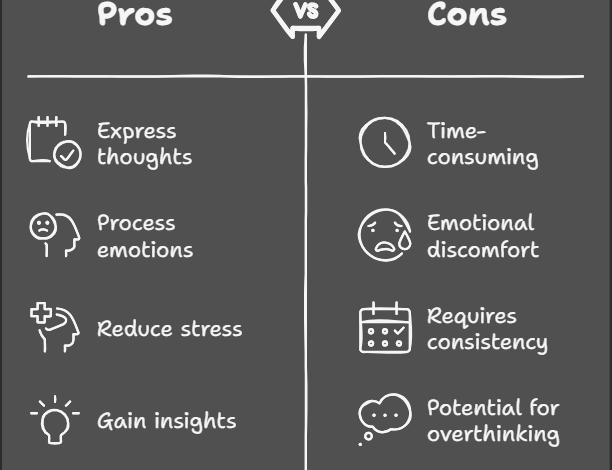journaling for mental health

Journaling for Mental Health: A Simple Path to Well-Being
In our fast-paced world, finding moments to pause and reflect can be challenging. Yet, dedicating a few minutes each day to write down our thoughts and feelings can significantly enhance our mental health. This practice, known as journaling for mental health, offers a multitude of benefits, from reducing stress to fostering self-awareness.
What is Journaling?
Journaling involves writing down your thoughts, feelings, experiences, and reflections. It’s a personal activity that allows you to express yourself freely, without judgment. Whether it’s through pen and paper or digital devices, journaling can be tailored to your preferences. For more insights into the benefits of journaling, check out this guide to journaling for mental health.
The Mental Health Benefits of Journaling
Engaging in regular journaling can lead to numerous mental health improvements:
1. Reduces Stress and Anxiety
Writing about your feelings can alleviate stress and anxiety. A study found that individuals who wrote online for 15 minutes, three days a week, experienced increased well-being and fewer depressive symptoms after one month. WebMD
2. Enhances Self-Awareness
Journaling helps you understand your emotions and thought patterns. This self-awareness can lead to better decision-making and a deeper understanding of your needs and desires.
3. Improves Emotional Well-Being
Expressing your thoughts on paper can lead to a more positive outlook. It allows you to process complex emotions, leading to improved mood and overall emotional health. Verywell Mind+4University of Rochester Medical Center+4Moonster Leather Products+4PositivePsychology.com
4. Aids in Managing Depression Symptoms
For individuals dealing with depression, journaling can be a therapeutic outlet. It provides a safe space to explore feelings and track mood changes, which can be beneficial in managing depressive symptoms. PMC

5. Enhances Communication Skills
Regular writing can improve your ability to articulate thoughts and feelings, both in writing and verbally. This enhancement can lead to better relationships and more effective communication.
How to Start Journaling for Mental Health
Embarking on a journaling journey doesn’t require special skills or extensive time. Here are some simple steps to help you begin:
1. Set Aside Time Daily
Dedicate a few minutes each day to write. Consistency helps in making journaling a habit. Choose a time that suits you—be it morning, afternoon, or evening.University of Rochester Medical Center
2. Keep It Simple
Your entries don’t need to be lengthy or structured. Write whatever comes to mind, without worrying about grammar or spelling. The goal is self-expression, not perfection.Psychologies+2Moonster Leather Products+2University of Rochester Medical Center+2University of Rochester Medical Center+1Moonster Leather Products+1
3. Use Prompts if Needed
If you’re unsure where to start, prompts can be helpful. Here are a few to inspire your writing:
- What are three things you’re grateful for today?
- Describe a moment that made you smile this week.
- What’s a challenge you’re currently facing, and how do you feel about it?
4. Be Honest and Open
Allow yourself to be vulnerable in your writing. Express your true feelings without fear of judgment. This honesty can lead to greater emotional clarity and healing.
5. Reflect and Revisit
Periodically read through your past entries. This reflection can provide insights into your personal growth and help identify patterns in your thoughts and behaviors.
Different Types of Journals
Journaling is a personal practice, and there are various styles to suit different preferences:
- Gratitude Journal: Focuses on writing down things you’re thankful for, fostering a positive mindset.
- Bullet Journal: Combines tasks, events, and notes in a concise format, aiding organization.
- Art Journal: Incorporates drawings, sketches, or collages alongside writing, offering a creative outlet.
- Dream Journal: Records dreams upon waking, which can be insightful for self-discovery.
Tips for Maintaining a Journaling Habit
Building a consistent journaling practice can be rewarding. Here are some tips to help you stick with it:
- Start Small: Begin with short entries and gradually increase length as you become more comfortable.
- Create a Comfortable Environment: Find a quiet, relaxing space free from distractions to write.
- Use Tools You Enjoy: Whether it’s a fancy notebook or a digital app, choose tools that make the process enjoyable.
- Be Patient with Yourself: It’s normal to miss a day or feel unsure about what to write. The key is to return and continue.
Additional Resources
For those interested in exploring journaling further, here are some resources:
- Journaling for Mental Health and Wellness: Provides tips and prompts to get started. HelpGuide+1Wikipedia+1
- How to Journal for Mental Health: Discusses the benefits and offers guidance on starting. Psychologies
- The Power of Journaling for Mental Health: Explores how writing can reduce stress and improve emotional well-being.
Conclusion
Incorporating journaling into your daily routine is a simple yet powerful way to enhance mental health. It offers a private space to express emotions, reflect on experiences, and foster personal growth. Whether you’re looking to reduce stress, gain clarity, or improve emotional well-being, journaling can be a valuable tool on your journey to better mental health.
For a visual guide on how to start journaling for mental health, you might find this video helpful:







